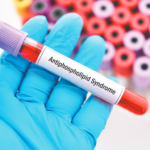 “Antiphospholipid syndrome (APS) is a condition in which antibodies are not just markers of disease but also drive pathogenesis,” says Jason S. Knight, MD, PhD, Marvin and Betty Danto Research Professor of Connective Tissue Research and professor of internal medicine, Division of Rheumatology, University of Michigan Medical School, Ann Arbor. “As rheumatologists become aware of new treatments approved for antibody-mediated disorders that are typically treated outside our specialty, such as myasthenia gravis and immune thrombocytopenic purpura, they can consider whether some of these innovative approaches might eventually be repurposed for APS.”
“Antiphospholipid syndrome (APS) is a condition in which antibodies are not just markers of disease but also drive pathogenesis,” says Jason S. Knight, MD, PhD, Marvin and Betty Danto Research Professor of Connective Tissue Research and professor of internal medicine, Division of Rheumatology, University of Michigan Medical School, Ann Arbor. “As rheumatologists become aware of new treatments approved for antibody-mediated disorders that are typically treated outside our specialty, such as myasthenia gravis and immune thrombocytopenic purpura, they can consider whether some of these innovative approaches might eventually be repurposed for APS.”
Dr. Knight is the co-author of a review that is part of a series on immunology for rheumatologists published in Arthritis & Rheumatology (A&R).1 In this new installment, Dr. Knight and co-author Thalia G. Newman, BS, review APS and the emerging therapeutic opportunities of this antibody-mediated disease.2 Ms. Newman is a PhD candidate in immunology and studying for her MS in bioinformatics in Dr. Knight’s lab at the University of Michigan Medical School.
Insights for Rheumatologists
The review presents a clinical case of a patient with severe, relapsing APS. The authors provide an overview of the pathophysiology of this thrombo-inflammatory disorder, highlighting the role of anti-beta-2 glycoprotein I (anti-β2GPI) antibodies. They detail the significance of the β2GPI plasma protein in health and disease before discussing the formation of anti-β2GPI antibodies.
The review describes the proinflammatory signaling pathways downstream of anti-β2GPI antibodies and provides examples of anti-β2GPI antibody activation of pro-thrombotic cells. The authors cover other considerations in APS pathogenesis, discuss the direction of APS treatment and conclude with a follow-up of the clinical case.
Along with more than 50 references, the review includes two informative tables. One table details actively recruiting clinical trials of the following agents targeting B cells and/or plasma cells in patients with APS: zanubrutinib, telitacicept combined with rituximab, telitacicept alone, an anti-CD38 monoclonal antibody, anti-CD19 chimeric antigen receptor (CAR) T cells, anti-CD19 CAR-natural killer (NK) cells, belimumab and anti‑B cell maturation antigen (BCMA)/CD19 CAR T cells. The other table specifies the challenges and opportunities for the APS field.
Additionally, two figures and legends demonstrate antiphospholipid (aPL) antibody testing and the relevant clinical associations, as well as the mechanisms of prothrombotic cell activation by anti-β2GPI IgG antibodies.
Therapeutic Opportunities
Currently incurable, APS is “characterized by an increased risk of macrovascular thrombotic events in both venous and arterial beds, microvasculature injury, placental insufficiency, cardiac valve disease, thrombocytopenia and other morbid features,” the authors write.


